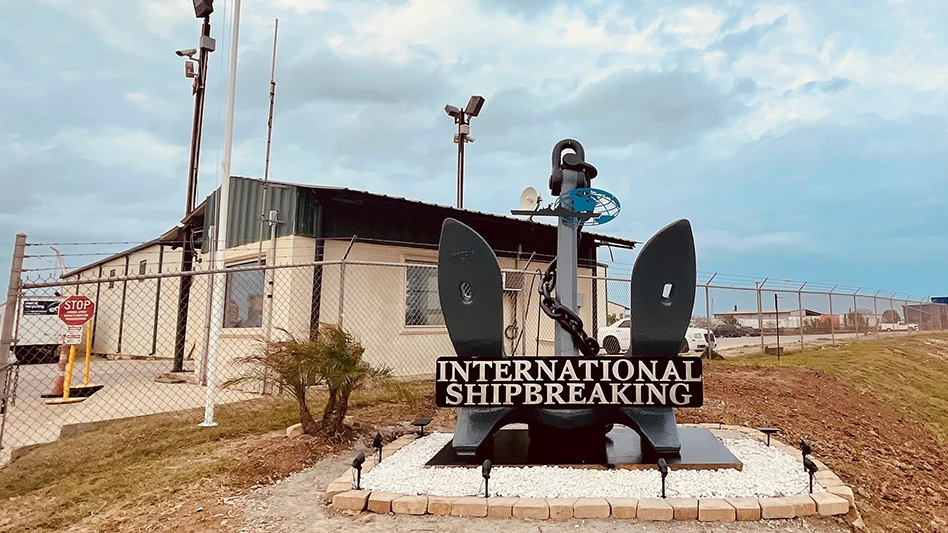
Photo courtesy of EMR Ltd.
When it comes to metal recycling, there aren’t many projects bigger than a U.S. Navy aircraft carrier. Such tasks are being tackled in Brownsville, Texas, by International Shipbreaking LLC (ISL), which is owned by United Kingdom-based EMR Ltd.
According to EMR, ISL has built a global reputation for recycling some of the world’s largest ships, ensuring metal harvested “goes straight back into a sustainable, circular economy.”
“Our company was founded in 1995 to provide a recycling service to the U.S. Navy,” says Chris Green, president of ISL, which was acquired by EMR in 2010.
“Every member of our team has been focused on improving our service and increasing our standards so that, when the time came, we would be the trusted ship recycling partner of choice for the more advanced nuclear powered fleet."
When seven “super carriers” were up for bid to be dismantled and recycled in 2014, ISL invested heavily in infrastructure required to safely secure and recycle the sizable vessels, and was awarded the contract to process five of them.
In 2018, ISL was vetted and deemed compliant with what EMR calls the most stringent ship recycling regulation in the world—the European Union Ship Recycling Regulations (EU SRR). Achieving that goal put International Shipbreaking on what EMR says is a short list of facilities outside of the EU that are allowed to recycle ships flying EU member states’ flags.
“International Shipbreaking can offer major shipping companies traceability, accountability and sustainability in our operations to meet the modern shipping industries increasing demands for a ship recycling option that aligns with company environmental, social and governance (ESG) policy,” Green says.
While Navy vessels are made from materials the metal recycling industry is used to handling, Green says the processes that underpin ISL’s operations are out of the ordinary for most recycling firms.
“Unlike a fridge or a vehicle, when you recycle a ship, you first need to make sure that you know what you are dealing with,” he says. “We do an environmental assessment and inventory of hazardous materials (IHM) so that, before we even bid on a ship, we know which waste materials are present and the cost to secure, remove and safely dispose of them.
“After this is complete, we draft a ship recycling plan that allows our teams to evaluate each stage of the project and calculate the most competitive price possible.”
Once work begins, ISL says it can call on some of the most advanced equipment anywhere in world to ensure that as much material as possible can find its way back into the metals sector circular economy.
“We have reinvested almost every penny that we have made back into getting our operations to the next level,” Green says. “This year we will be refurbishing the infrastructure that’s already here and investing in new equipment.
“A great example is the investments we’ve made [is] in cable recycling. We realized that this represented a large percentage of our [scrap] and, by installing a cable chopper, we reduced what we were sending to landfill by 30 percent almost immediately.”
Not all shipbreaking firms are this focused on improving their operations, says EMR.
The company says shipbreaking is viewed by many as an industry in need of reform. Ships have traditionally been sent to shipbreaking beaches in Asia, where for decades the result might be dangerous working conditions with high rates of fatalities as well as unsafe processes that cause environmental damage.
“Having an alternative to this, which meets all of the EU requirements and hits a standard mandated by the U.S. Navy, is going to be instrumental in creating a more sustainable global shipbreaking industry,” says Green.
“Increasingly we’re seeing investors telling ship operators they have to have a plan in place for the recycling of a ship once it reaches end of life, and our company offers a sustainable option while still paying a competitive price."
Since 2010, Green says the ISL team has benefited from the logistical support and strategic experience of the wider EMR business, and it’s a relationship he says will help ISL to continue its success in the years ahead.
“Right now, we’re the most advanced shipbreaking operation in the United States, and we’re working hard to become the most advanced shipbreaking operation in the world,” he says.
Latest from Recycling Today
- Unifi launches Repreve with Ciclo technology
- Fenix Parts acquires Assured Auto Parts
- PTR appoints new VP of independent hauler sales
- Updated: Grede to close Alabama foundry
- Leadpoint VP of recycling retires
- Study looks at potential impact of chemical recycling on global plastic pollution
- Foreign Pollution Fee Act addresses unfair trade practices of nonmarket economies
- GFL opens new MRF in Edmonton, Alberta






